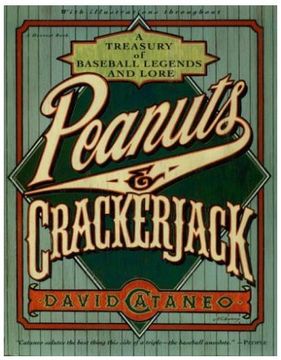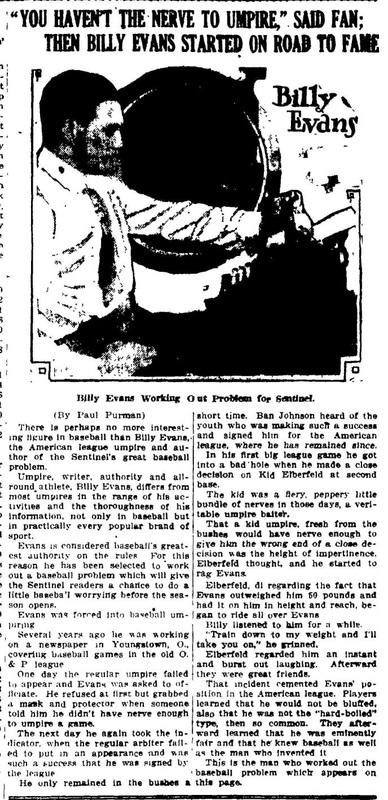Peanuts & Crackerjack: A Treasury Of Baseball Legends And Lore by David Cataneo
The day he broke into the American League, umpire Billy Evans was quickly tested by diminutive (five feet, five inches, 143 pounds) but belligerent New York shortstop Kid Elberfeld. In the first inning, Evans ruled Elberfeld out on a close play at first base. "Out!" yelled Elberfeld, leaping and churning his fists in the air. "You big, blind bum!" Evan said nothing. Elberfeld interpreted the silence as a sign of weakness. "And you're dumb as well as blind," growled Elberfeld, also known as the Tabasco Kid. "I've got a notion to punch you right in the nose." Evans stepped up close to him. "Mr. Elberfeld," he said. "I've heard a lot about you. I've heard you're pretty tough. But just between you and me, I've got my doubts.Now here's my nose. Go ahead and poke at it. Only I'm warning you, my arms are not tied. If you want some real action, just throw one at this bugle of mine." Elberfeld smiled slightly, looked Evans up and down, and asked how much he weighed. Evans said about 175 pounds. "Well, you big stiff." Said Elberfeld, walking away in disgust. "You got a lot of nerve picking a fuss with a guy who weighs forty pounds less than you do."
Product Details
Product Details
- Paperback: 304 pages
- Publisher: Mariner Books (March 30, 1994)
- Language: English
- ISBN-10: 0156715686
- ISBN-13: 978-0156715683
- Product Dimensions: 9 x 7 x 0.7 inches
- Shipping Weight: 1.6 pounds
- Average Customer Review: 4.7 out of 5 stars
- Amazon Best Sellers Rank: #3,082,063 in Books
Kid Elberfeld Time Line - February 20, 1917 Fitchburg Daily Sentinel (Fitchburg, Massachusetts) Source: ancestry.com/
"You Haven't the nerve to umpire" said fan; then Billy Evans started on road to fame By Bill Purman
There is perhaps no more interesting figure in baseball than Billy Evans, the American league umpire and author of the Sentinel's great baseball problem. In his first big league game he got into a bad hole when he made a close decision on Kid Elberfeld at Second base. The kid was a fiery, peppery little bundle of nerves in those days, a veritbale umpire baiter. That a kid umpire, fresh from the bushes whould have nerve enough to give him the wrong end of a close decision was the height of impertinence, Elberfeld thought, and he started to rag Evans. Elberfeld, disregarding the fact that Evans outweighed him 50 pounds and had it on him in height and reach, began to ride all over Evans. Billy listened to him for a while. "Train down to my weight and I'll take you on," he grinned. Elberfeld regarded him an instant and burst out laughing. Afterward they were great friends. That incident cemented Evan's position in the American league. Players learned that he would not be bluffed, also that he was not the "hard-boiled" type, then so common. They afterward learned that he was eminently fair and that he knew baseball as well as the man who invented it.
"You Haven't the nerve to umpire" said fan; then Billy Evans started on road to fame By Bill Purman
There is perhaps no more interesting figure in baseball than Billy Evans, the American league umpire and author of the Sentinel's great baseball problem. In his first big league game he got into a bad hole when he made a close decision on Kid Elberfeld at Second base. The kid was a fiery, peppery little bundle of nerves in those days, a veritbale umpire baiter. That a kid umpire, fresh from the bushes whould have nerve enough to give him the wrong end of a close decision was the height of impertinence, Elberfeld thought, and he started to rag Evans. Elberfeld, disregarding the fact that Evans outweighed him 50 pounds and had it on him in height and reach, began to ride all over Evans. Billy listened to him for a while. "Train down to my weight and I'll take you on," he grinned. Elberfeld regarded him an instant and burst out laughing. Afterward they were great friends. That incident cemented Evan's position in the American league. Players learned that he would not be bluffed, also that he was not the "hard-boiled" type, then so common. They afterward learned that he was eminently fair and that he knew baseball as well as the man who invented it.





